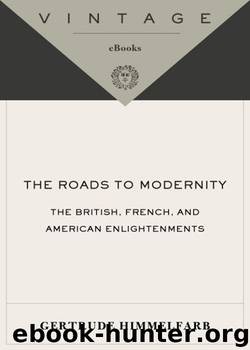The Roads to Modernity by Himmelfarb Gertrude

Author:Himmelfarb, Gertrude.
Language: eng
Format: epub
Tags: Fiction
ISBN: 9780307429254
Publisher: Random House Inc.
Published: 2007-12-17T16:00:00+00:00
REASON AND RELIGION
It was not only the philosophes’ penchant, as Tocqueville said, for abstract principles that made them unique. It was a particular principle: reason. That word, repeated constantly and in the most varied contexts, served almost as a mantra, a token of good faith and right-mindedness.29 Long before Paine declared his age to be the “Age of Reason,” Diderot had defined the Encyclopédie as the instrument of “a reasoning age,” “a philosophical age.” 6 This article was nicely complemented by another which made the philosophe not only the spokesman of that philosophical age but something more as well. The reader was reminded of the familiar adage (pedantically attributed to the emperor Antoninus): “How happy the people would be if kings were philosophers or philosophers were kings.”7
The idea of reason had as its converse the idea of religion. “Reason is to the philosopher,” the Encyclopédie declared, “what grace is to the Christian. Grace moves the Christian to act, reason moves the philosopher.”8 Here, as elsewhere, reason was not just pitted against religion, defined in opposition to religion; it was implicitly granted the same absolute, dogmatic status as religion. In this sense, reason was the equivalent of the doctrine of grace. There is much truth in the familiar assertion that the philosophes’ animus against religion was a by-product of their hostility to the Catholic Church, a church that was seen as authoritarian and repressive in itself, and even more so as the accomplice of an authoritarian and repressive state. This was, certainly, a dominant factor in their thinking. But it does not entirely account for the “studious ferocity,” as Tocqueville put it, of their attack on religion.9 What was at stake for the philosophes was nothing less than reason. And reason illegitimized not only the Catholic Church but any form of established or institutional religion, and beyond that any religious faith dependent on miracles or dogmas that violated the canons of reason.
Some of the articles commissioned or written by Diderot—on “Conscience,” “Fanaticism,” “Irreligion,” “Tolerance,” “Intolerance”—rather than taking issue with religion as such, made the case for religious toleration, the liberty to profess other religions than Catholicism, or, it may be, no religion at all. In “Irreligion,” Diderot argued that such liberty would have no serious consequences for society because morality was independent of religion. Other articles, by the Baron d’Holbach notably, were overtly anti-religion; “Priests” and “Theocracy” suggested that religion was an invention by clever clerics who imposed it on the ignorant and intimidated masses. Still others made just enough concessions to orthodoxy to forestall censorship and prosecution.
Diderot’s article on “Reason” was typically and deliberately ambiguous, paying lip service to religion by conceding an area in which revelation was entitled to “complete assent from the mind,” and then hastening to add that this did not limit or undermine reason but rather confirmed reason in all matters where there was “a clear and distinct idea.” In such cases, reason was the only “true and competent judge”; revelation could confirm judgments based upon reason but could not invalidate them.
Download
This site does not store any files on its server. We only index and link to content provided by other sites. Please contact the content providers to delete copyright contents if any and email us, we'll remove relevant links or contents immediately.
The remains of the day by Kazuo Ishiguro(8981)
Tools of Titans by Timothy Ferriss(8369)
Giovanni's Room by James Baldwin(7330)
The Black Swan by Nassim Nicholas Taleb(7112)
Inner Engineering: A Yogi's Guide to Joy by Sadhguru(6785)
The Way of Zen by Alan W. Watts(6604)
Asking the Right Questions: A Guide to Critical Thinking by M. Neil Browne & Stuart M. Keeley(5762)
The Power of Now: A Guide to Spiritual Enlightenment by Eckhart Tolle(5761)
The Six Wives Of Henry VIII (WOMEN IN HISTORY) by Fraser Antonia(5505)
Astrophysics for People in a Hurry by Neil DeGrasse Tyson(5182)
Housekeeping by Marilynne Robinson(4436)
12 Rules for Life by Jordan B. Peterson(4299)
Double Down (Diary of a Wimpy Kid Book 11) by Jeff Kinney(4261)
Ikigai by Héctor García & Francesc Miralles(4252)
The Ethical Slut by Janet W. Hardy(4246)
Skin in the Game by Nassim Nicholas Taleb(4240)
The Art of Happiness by The Dalai Lama(4125)
Skin in the Game: Hidden Asymmetries in Daily Life by Nassim Nicholas Taleb(3993)
Walking by Henry David Thoreau(3953)
